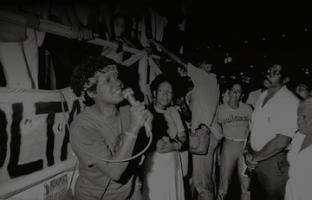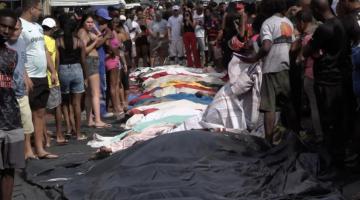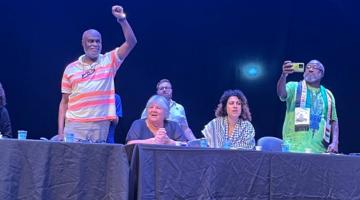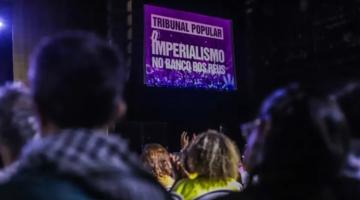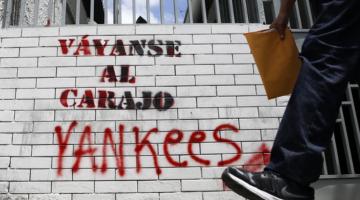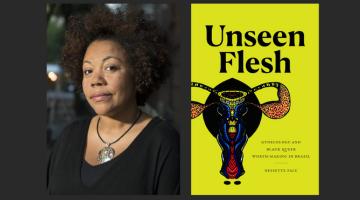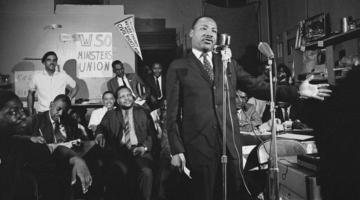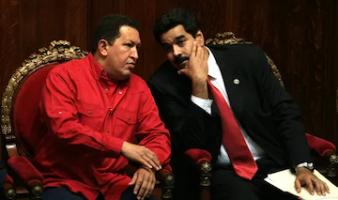Bolsonaro’s conviction is not a victory for democracy but a revelation of its fragility. It exposes a military that remains the armed wing of the ruling class and a fascist project dedicated to suppressing Brazil’s Black majority.
On September 11, 1973, General Augusto Pinochet led a coup against the democratically elected President of Chile, Salvador Allende, and installed a dictatorship that lasted until 1990, the year that Jair Bolsonaro was elected to the Brazilian House of Representatives. In 2019, three months after assuming the Brazilian Presidency, Bolsonaro went to Chile to pay homage to Pinochet, who had died in 2006. Pinochet was and is a Bolsonaro hero, as are the key members of the Brazilian military which led the U.S.-backed coup against the democratically elected government of João Goulart in 1964.
It is ironic that on September 11, 2025, ex-President Bolsonaro, one of the most polarizing figures in recent Latin American history, and seven other defendants of the highest Brazilian military rank were condemned for an attempted coup, which included documented plans to assassinate Brazil's current President Luiz Ignacio Lula da Silva, his Vice President, and a leading member of Brazil's Supreme Court.
Bolsonaro’s conviction stemmed from his orchestration of this failed coup d’état following his defeat by President Luiz Inácio Lula da Silva in the 2022 presidential election. Lula was inaugurated President for his third term on January 1, 2023.
While the January 8, 2023, assault on Brazil’s Congress, Presidential Palace, and Supreme Court was initially dismissed as a riot, further investigations revealed a highly coordinated plot involving senior military officials, cabinet members, and Bolsonaro himself. Unlike the January 6th assault on the U.S. Capitol, the Brazilian assault took place after Lula was officially in office.
Several more weeks of political jockeying and even legislative maneuvers to reduce the sentence of 27 years and 3 months are at hand before jail time begins. Most predict that the 4-1 vote of Brazil’s Supreme Court means that before the end of the year Bolsonaro will begin facing the reality of several decades in a Brazilian federal penitentiary.
There are, however, several ongoing back stories that will continue and would have continued regardless of the outcome of the trial,which is not to ignore the alternative history that would have been, had Bolsonaro been acquitted. History will record one fact: this is the first time that Brazilian civil society reacted with fortitude and resolve to fully check a military-led threat to the country’s democracy.
Had Bolsonaro been acquitted, Brazil would have missed the opportunity to finally impose civilian rule and justice over its own military. The U.S.-backed coup in 1964,which overturned a fully acknowledged democratically elected government, has still never been fully addressed. No one from the military junta was ever jailed, much less put on trial.
Chile and Argentina have pursued comparatively robust prosecutions of their military juntas, although challenges like amnesty laws, statutes of limitation, legal immunity, and political resistance have slowed or complicated these processes.
Uruguay was initially less successful due to self-imposed amnesty, but some accountability has been achieved in recent years through court rulings and international human rights pressure. With the election of José “Pepe” Mujica as President (2010-2015), a former member of the Tupamaros left-wing urban guerilla group, some meaningful reforms were imposed like the legalization of same sex marriage, abortion, and the regulated sale of marijuana. Uruguay has come a long way in terms of societal reconciliation.
Paraguay has been largely frustrated in its attempts to reckon with the past – the Stroessner dictatorship (1954-1989) one of the longest in the region, resulted in Stroessner dying in exile in 2006, having never been tried. Brazil, by way of comparison, has seen its civilian efforts to reign in the military for the coup (1964-1985) repeatedly frustrated.
In 1979, under military President João Figueiredo, Brazil enacted a broad amnesty law that pardoned political crimes committed by both the military regime and by state agents (including military personnel) during the dictatorship. Effectively, this blocked most legal attempts to prosecute abuses such as unlawful detentions, torture, disappearances and assassinations by the military.
From 2011-2014, under then President Dilma Rouseff (herself a victim of torture during the dictatorship), Brazil created the National Truth Commission (Comissão Nacional da Verdade (CNV)), which issued a report in 2014 documenting various abuses (including torture, killings and disappearances). They also named the perpetrators and the victims, but they had no prosecutorial powers due in large part to the Amnesty Law.
The prosecution of Bolsonaro, along with several high-ranking military officials, was civil society’s “second bite at the apple.”
Jair Bolsonaro’s Conviction and the Class Struggle in Brazil
It is more than reasonable to assume, that but for the fully documented assassination plans of Bolsonaro and his top military supporters, that the mere storming of the capital in Brasília on January 8, 2023, may have resulted in considerably lighter sentencing. And given right wing domestic pressures, and direct pressure from the Trump administration in a number of forms (including the 50% tariffs), it isn't out of the realm of imagining to conclude, that but for hard irrefutable documented evidence of the planned assassinations that Bolsonaro might have been fully acquitted or not tried at all.
This verdict, years in the making, marks not just the legal downfall of a man, but reveals the deep class antagonisms and institutional crises that define Brazil’s democracy. Bolsonaro’s conviction must be placed within a broader context of ruling class reaction, military impunity, and the ever-present threat of fascism.
The Planned Assassination of Lula, Alckmin, and Moraes
According to official testimony and leaked documents, the Bolsonaro camp prepared for a "total seizure" of the Brazilian state following the 2022 election. In addition to sowing doubt about the electronic voting system, they planned a series of extrajudicial actions, including the assassination of key political figures. This wasn't discovered, however, until over a year and a half into Lula’s presidency. A former military intelligence operative who was part of the planning group defected with documentation of signed orders, maps, and detailed communications among generals and Bolsonaro loyalists that confirmed plans to assassinate President Lula, Vice President Geraldo Alckmin, and Supreme Court Justice Alexandre de Moraes. The international press, for the most part, downplayed the assassination plot, focusing instead on the more “palatable” aspects of electoral fraud and coup rhetoric.
The Story of Marielle Franco
This wasn’t Bolsonaro’s first brush with political violence. In March 2018, prior to Bolsonaro’s election as President later in the year, a charismatic up-and-coming Rio de Janeiro city councilwoman Marielle Franco—an Afro-Brazilian, LGBTQ+, socialist politician—was assassinated by professional hitmen. Ballistics matched the bullets to a batch once held by the federal police. More damningly, one of the killers lived in the same upper middle-class gated community as Bolsonaro and had family connections to the Bolsonaro sons, particularly Flávio Bolsonaro, then a state legislator. Witnesses placed one of the suspects visiting Bolsonaro’s home on the night of the assassination. Though the case stagnated for years, recent developments suggest that this political assassination was part of a broader strategy of terror and elimination. The determination of “who” sent the hitmen is still pending.
The Bolsonaro Phenomenon
Bolsonaro represents a counterrevolutionary force of the petty bourgeoisie and elites, deployed to crush the rising demands of Brazil’s working class and Black populations. In large measure, these demands were triggered by the rise of the Worker’s Party and Lula’s election in 2002. Brazil’s first affirmative action program in public higher education for instance was announced by Lula in 2003.
To put this in perspective, the emancipation of Brazil’s enslaved people occurred in 1888. There is no and has never been a network of “historically black colleges and universities” in Brazil or any other means of economic and social improvement of the kind that were present in the United States, such as the aborted post-civil war reconstruction. Despite the government statistic that those of African descent in Brazil officially represent 55% of the population of roughly 220 million, the only sectors of society where “blacks” have some penetration is in sports and entertainment generally.
Bolsonaro’s administration weaponized the state against indigenous peoples, labor unions, environmental activists, the Landless Workers’ Movement (MST), and the urban poor (85%+ of whom are of African descent). Bolsonaro’s fascism, like that of Trump and Modi, emerged in response to the structural crises of capital.
In this context, the assassination of Marielle Franco served not merely as a political hit, but as a message: any public articulation of class, race, and gender struggle would be met with lethal force. The attempted coup of 2023, followed by the planned assassinations of Brazil’s democratically elected leaders, should be seen as the logical outcome of a fascist project rooted in preserving elite privilege and foreign capital interests—especially among agribusiness, evangelical financiers, and military-industrial circles.
The Role of the Brazilian Military and Bourgeois Institutions
The Brazilian Armed Forces have always served as the repressive arm of the ruling class—from the 1964 military coup to their silent complicity during Bolsonaro’s presidency. In fact, Bolsonaro himself is a former military officer who rose to prominence defending the torture and repression of the dictatorship era. The 2025 trial revealed that multiple generals of the highest rank were complicit in the 2023 plot.
The International Dimension
Internationally, Bolsonaro was a client and puppet of Trumpism and U.S. imperialism. His alignment with Steve Bannon, Mike Pompeo, and global far-right networks illustrates how fascism today operates through transnational capitalist coordination. While the U.S. State Department eventually recognized Lula’s election, it remained largely silent during the first year of investigations into the coup and assassination plot. Only after the convictions last week by the Brazilian Supreme Court did Western media begin to reframe Bolsonaro as a “threat to democracy,” having ignored or downplayed the evidence for years.
The assassination plot against Lula, if successful, would have destabilized the entire Latin American left resurgence. The silence of international capital is revealing – bourgeois democracies only denounce fascism when it fails. When it succeeds—as in Chile (1973), Bolivia (2019), or Haiti (2004)—they call it “restoring order.”
The conviction of Jair Bolsonaro is historically significant, but insufficient. The state, even when ruled by a left-leaning administration, remains a tool of class domination unless fundamentally transformed by popular power. The Brazilian left must now reckon with the forces that structured and allowed for Bolsonaro’s rise and the networks of capital that sustained him.
Brazil is a capitalist engine, but its economic structure and political institutions serve a particular purpose – namely, to maintain the population (read: the African descendant majority), in a permanent deeply subservient role to a disproportionately small financial elite.
Until Bolsonaro and his convicted military supporters begin serving their judicially imposed incarceration, the focus has to be on completing the judicial process that potentially could last until December.
Assuming this comes to pass, the struggle to empower the vast majority of this country continues.
R. E. Wilson, is a philosopher and the founder of Gaia Labs LLC.

